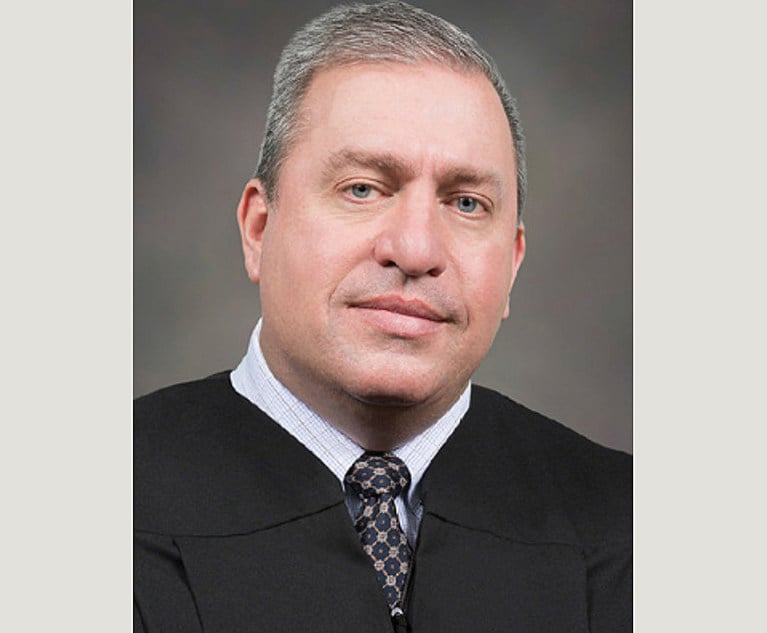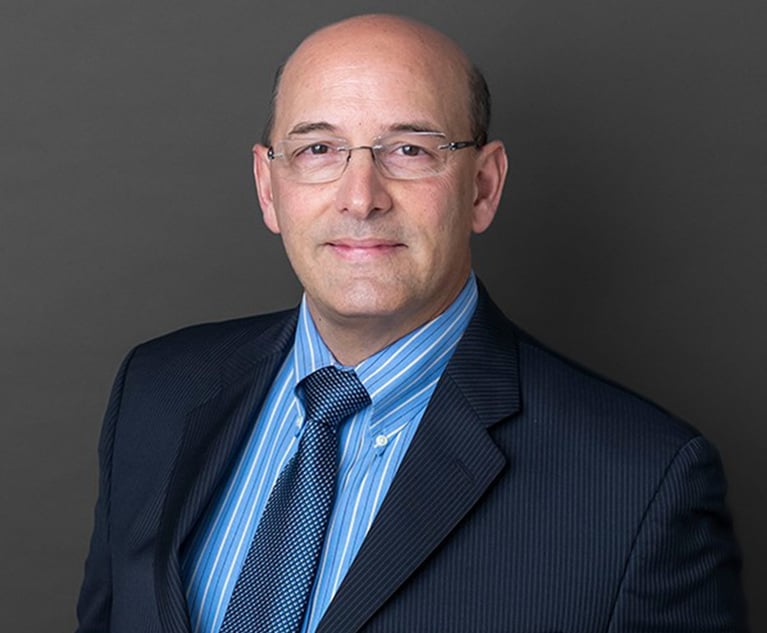 David Schwager, with Chariton, Schwager & Malak, and president of the Pennsylvania Bar Association.
David Schwager, with Chariton, Schwager & Malak, and president of the Pennsylvania Bar Association.Pandemic Can Teach Legal Profession How to Weather Future Disruption, New PBA Head Says
"What's clear is we have to be able to continue to operate our law offices, our various filing offices and the courts on a seamless basis," said David Schwager in an interview with The Legal.
May 18, 2020 at 10:09 AM
5 minute read
In just two months, the spread of COVID-19 slowed the practice of law and hobbled court systems, but the Pennsylvania Bar Association's new president is looking to capitalize on lessons learned from the chaotic, early days of the pandemic, and to focus his tenure on strengthening the preparedness of the state's legal system so the gears of justice can continue to grind uninterrupted, no matter what disruption the future may bring.
Earlier this month, Wilkes-Barre, Pennsylvania-based attorney David Schwager of Chariton, Schwager & Malak was sworn in as the new head of the Pennsylvania Bar Association. He takes over the role from Anne John.
According to Schwager, who took an active role behind John in helping the association tackle the legal community's immediate needs as the highly contagious virus began to take hold, the last two hectic months have exposed a need for better preparedness as a whole. That is why, he said, he hopes to focus his tenure on helping venues and law firms bridge the gap during the difficult times.
"If we can't overcome those challenges and others, there could be significant consequences that befall our clients … at a time when they're most vulnerable," he said. "What's clear is we have to be able to continue to operate our law offices, our various filing offices and the courts on a seamless basis."
To that end, in one of his first acts as president, Schwager formed a task force aimed at strengthening the continuity of legal services across the state. According to Schwager, the task force will focus in part on finding ways to bring more uniform technological capabilities across the state. Retired Judge Thomas Vanaskie of the U.S. Court of Appeals for the Third Circuit is set to chair the group. The former judge is no stranger to vast technological challenges, as back in 2005 then-U.S. Chief Justice William Rehnquist appointed him chairman of the Judicial Conference Information Technology Committee.
Schwager also said that since the issue cuts across all aspects of the law, the task force will give the bar an opportunity to work closely with significant stakeholders across the state, including the Pennsylvania Trial Lawyers Association, the Pennsylvania Defense Institute and the Pennsylvania District Attorneys Association.
"We need to be prepared as a legal system to deal with that, and to show the public that business is continuing as usual in the court system and the legal system," he said. "We hope we can all work together and find new collaborative ways to be stronger together."
Despite the coronavirus, Schwager said his longer-term priorities remain largely the same. Increasing membership and revenue are important, as well as expanding services for members and reducing dues, he said.
"The focus of a lot of these groups is going to change ever so slightly to address the needs of the current climate, but by and large, it's a lot of the same things," Schwager said.
Schwager is a graduate of Penn State's Dickinson School of Law. He focuses his law practice on real state and business law. He has also been active in the state and local bar associations, and previously served as chairman of the Supreme Court's Disciplinary Board.
Schwager was sworn in as president during the first-ever House of Delegates meeting the PBA held online. Instead of being ushered in by a flank of attorneys from his area, which is what usually takes place for new presidents, his colleagues surprised him with a "Star Wars"-themed video introducing him to the group.
The move was touching, Schwager said, but he expects overcoming that distance will be one of the biggest challenges he faces, since he will no longer be able to attend local chapter meetings, at least for the foreseeable future.
"It's hard to replicate the face-to-face, one-on-one interactions that as president of the PBA I am able to have," he said.
Even before taking over, Schwager and others at the PBA have been hard at work trying to address the legal industry's difficulties. Noting John's leading role over the past few months, Schwager said the association worked to lobby the governor's office of legal counsel to allow attorneys to access their offices despite the statewide closure. The group has also worked to develop the law allowing for remote notarization, pushed for extensions regarding CLE credit requirements and expanded access online, and advocated for recent law school graduates to practice under a provisional law license while bar exams have been suspended.
Schwager also noted that the bar association has discounted its rates for courses and webinars offered through the recently acquired Pennsylvania Bar Institute, and has extended dues waivers for attorneys who are facing financial hardships.
Although tragic, the moment, Schwager said, has proved a great example of why attorneys should be members of the association.
"If you were not a member of an organized bar association, you probably weren't getting the sort of support and information, and really all sorts of guidance and uplifting information, that we got from so many places, everything from online yoga classes all the way to how to apply for paycheck protection," he said. "It really demonstrated for most people why it is they're members."
This content has been archived. It is available through our partners, LexisNexis® and Bloomberg Law.
To view this content, please continue to their sites.
Not a Lexis Subscriber?
Subscribe Now
Not a Bloomberg Law Subscriber?
Subscribe Now
NOT FOR REPRINT
© 2024 ALM Global, LLC, All Rights Reserved. Request academic re-use from www.copyright.com. All other uses, submit a request to [email protected]. For more information visit Asset & Logo Licensing.
You Might Like
View All
Pa. High Court to Weigh Parent Company's Liability for Dissolved Subsidiary's Conduct
3 minute read
Pa. Supreme Court Taps New Philadelphia Family Division Administrative Judge
3 minute read
People in the News—Nov. 27, 2024—Flaster Greenberg, Tucker Arensberg
3 minute read
Trending Stories
- 1Judge Denies Sean Combs Third Bail Bid, Citing Community Safety
- 2Republican FTC Commissioner: 'The Time for Rulemaking by the Biden-Harris FTC Is Over'
- 3NY Appellate Panel Cites Student's Disciplinary History While Sending Negligence Claim Against School District to Trial
- 4A Meta DIG and Its Nvidia Implications
- 5Deception or Coercion? California Supreme Court Grants Review in Jailhouse Confession Case
Who Got The Work
Michael G. Bongiorno, Andrew Scott Dulberg and Elizabeth E. Driscoll from Wilmer Cutler Pickering Hale and Dorr have stepped in to represent Symbotic Inc., an A.I.-enabled technology platform that focuses on increasing supply chain efficiency, and other defendants in a pending shareholder derivative lawsuit. The case, filed Oct. 2 in Massachusetts District Court by the Brown Law Firm on behalf of Stephen Austen, accuses certain officers and directors of misleading investors in regard to Symbotic's potential for margin growth by failing to disclose that the company was not equipped to timely deploy its systems or manage expenses through project delays. The case, assigned to U.S. District Judge Nathaniel M. Gorton, is 1:24-cv-12522, Austen v. Cohen et al.
Who Got The Work
Edmund Polubinski and Marie Killmond of Davis Polk & Wardwell have entered appearances for data platform software development company MongoDB and other defendants in a pending shareholder derivative lawsuit. The action, filed Oct. 7 in New York Southern District Court by the Brown Law Firm, accuses the company's directors and/or officers of falsely expressing confidence in the company’s restructuring of its sales incentive plan and downplaying the severity of decreases in its upfront commitments. The case is 1:24-cv-07594, Roy v. Ittycheria et al.
Who Got The Work
Amy O. Bruchs and Kurt F. Ellison of Michael Best & Friedrich have entered appearances for Epic Systems Corp. in a pending employment discrimination lawsuit. The suit was filed Sept. 7 in Wisconsin Western District Court by Levine Eisberner LLC and Siri & Glimstad on behalf of a project manager who claims that he was wrongfully terminated after applying for a religious exemption to the defendant's COVID-19 vaccine mandate. The case, assigned to U.S. Magistrate Judge Anita Marie Boor, is 3:24-cv-00630, Secker, Nathan v. Epic Systems Corporation.
Who Got The Work
David X. Sullivan, Thomas J. Finn and Gregory A. Hall from McCarter & English have entered appearances for Sunrun Installation Services in a pending civil rights lawsuit. The complaint was filed Sept. 4 in Connecticut District Court by attorney Robert M. Berke on behalf of former employee George Edward Steins, who was arrested and charged with employing an unregistered home improvement salesperson. The complaint alleges that had Sunrun informed the Connecticut Department of Consumer Protection that the plaintiff's employment had ended in 2017 and that he no longer held Sunrun's home improvement contractor license, he would not have been hit with charges, which were dismissed in May 2024. The case, assigned to U.S. District Judge Jeffrey A. Meyer, is 3:24-cv-01423, Steins v. Sunrun, Inc. et al.
Who Got The Work
Greenberg Traurig shareholder Joshua L. Raskin has entered an appearance for boohoo.com UK Ltd. in a pending patent infringement lawsuit. The suit, filed Sept. 3 in Texas Eastern District Court by Rozier Hardt McDonough on behalf of Alto Dynamics, asserts five patents related to an online shopping platform. The case, assigned to U.S. District Judge Rodney Gilstrap, is 2:24-cv-00719, Alto Dynamics, LLC v. boohoo.com UK Limited.
Featured Firms
Law Offices of Gary Martin Hays & Associates, P.C.
(470) 294-1674
Law Offices of Mark E. Salomone
(857) 444-6468
Smith & Hassler
(713) 739-1250





